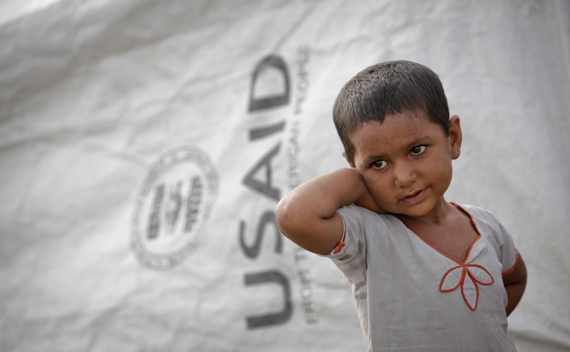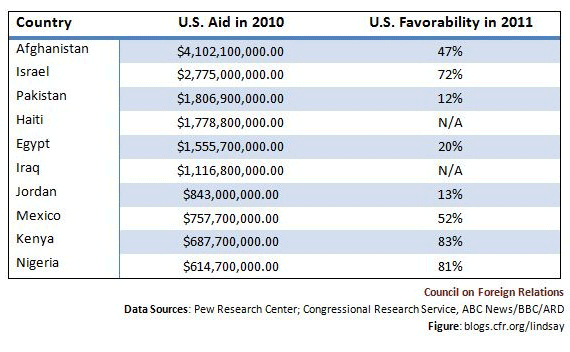Foreign Aid and Gratitude
By experts and staff
- Published
Experts
![]() By James M. LindsayMary and David Boies Distinguished Senior Fellow in U.S. Foreign Policy
By James M. LindsayMary and David Boies Distinguished Senior Fellow in U.S. Foreign Policy

Last week’s Republican presidential debate had an online video question from a voter asking why “we send billions of dollars overseas to people who hate us.” It’s not only average Americans who are asking the question. As my colleague Ed Husain points out in his new blog, “The Arab Street,” Idaho Republican senator James Risch struck the same note: “Frankly, I’m getting tired of it, and I think Americans are getting tired of it as far as shoveling money in there at people who just flat don’t like us.”
Here’s a chart listing the ten biggest recipients of U.S. aid in 2010 along with how favorably the publics in those countries view the United States.

It’s a mixed bag. The publics in three countries (Israel, Kenya, and Nigeria) like us; the publics in two countries (Afghanistan and Mexico) are ambivalent; the publics in three countries (Egypt, Jordan, and Pakistan) are hostile; and we don’t have reliable data on the publics in two countries (Haiti and Iraq).
Should the United States slash aid to countries that don’t like us? No, or at least not because we think they should show more gratitude. Washington doles out aid primarily based on calculations about how to advance U.S. strategic interests rather than assessments of pure need, which is why Afghanistan, Israel, and Pakistan top the list of aid recipients rather than Burundi, Congo, and Mali. Nor are foreign publics necessarily being ingrates when they don’t hold favorable views of the United States. They may dislike other aspects of U.S. foreign policy, see the aid propping up an unpopular government or lining the pockets of corrupt elites (common complaints among Americans as well), or not even know that their country receives U.S. aid.
With respect to this last point, CFR ran a project a few years back that did focus groups with Egyptians, Moroccans, and Indonesians. One of the findings was that in all three countries people vastly underestimated how much aid the U.S. government gave their countries and did not know what it was spent on. As they learned more about U.S. aid programs, they looked upon the United States more favorably. Unfortunately, there are practical obstacles to advertising U.S. aid to local publics. They will see “From the American People” on sacks of food during a famine. They won’t see “From the American People” on a plaque on a new turbine at a power plant. Worse yet, in some countries stamping “From the American People” on a building or new bus would increase the chances of it being targeted in a terrorist attack.
But the overall lesson is clear: if you are giving aid solely to be liked, be prepared for disappointment.
NOTE ON THE DATA: The numbers on U.S. foreign aid are taken from the Congressional Research Service FY2011 Budget and Appropriations report. Most of the public opinion data comes from the Pew Global Attitudes Project poll in 2011. The figure for Nigerian public opinion comes from the Pew Global Attitudes Project poll in 2010. The figure for Afghan public opinion comes from the Gary Langer and ABC News Afghanistan poll analysis on February 9, 2009.
